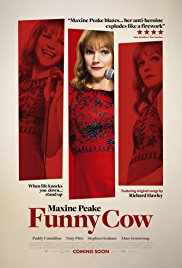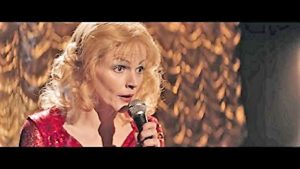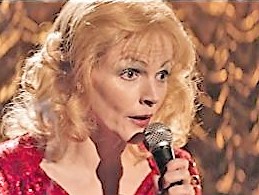Funny Cow **** (2017, Maxine Peake, Paddy Considine, Alun Armstrong, Tony Pitts, Stephen Graham) – Movie Review

Maxine Peake is on peak form in the raw 2017 British drama film Funny Cow, acting bravely and brilliantly as a troubled working class woman who turns herself into a comedienne playing working men’s clubs in seventies Yorkshire.
Maxine Peake is on peak form – but then she always is – acting bravely and quite brilliantly as a troubled working class woman who turns herself into a comedienne playing working men’s clubs in seventies Yorkshire, as a means of survival or revenge or whatever. After a lifetime of abuse – by her father as a child, and by her husband as an adult – she is a survivor, but she is emotionally frozen. She is dead woman walking, or dead woman telling jokes, I suppose.
While married to a violent husband, she meets a middle class bookshop owner, Angus (Paddy Considine), and he is as desperate and needy as she is, for reasons we never learn. The film just isn’t about him. A little hope is offered at this point. Hope springs eternal, so could there be a happy ending here?
She also meets an old-time comic (Alun Armstrong), interestingly called Lenny, but more accessing Freddie Frinton than Lenny Bruce. Armstrong is very good, acting a pathetic burnt-out case, and giving the best male performance in the film. Lenny tells Funny Cow she can’t be a comic – women aren’t funny – but he just about helps her anyway, and unintentionally gives her her first chance.
Funny Cow is as dark and bleak as hell, though the script is packed with gallows humour. The film is admirable, and just about this side of entertaining, though it is well depressing, even despairing. It is a cry in the dark. Needless to say, it doesn’t have a happy ending, just a truthful one. None of the characters have happy endings, just miserable lives of misery, violence and suffering. It is bleak alright.
You can’t help admiring and sympathising with Peake’s Funny Cow character. Peake ensures that. She is magnetic and mesmerising. Against the evidence and your better judgement, you kind of think the story is going to resolve itself nicely, offer at least a little ray of sunshine, but of course it doesn’t. It can’t.
Though set in a past, and in a particular place, it seems to suggest that it is still relevant and still timely and still universal. Abuse, human indifference and suffering go on. It’s the way of the world. It offers no solution. Survival of the fittest in a human jungle is the best the strong can hope for.
Some of the dialogue and situations might be funny, but, as well as male violence to women, there’s a lot of very strong language, and racist, sexist and homophobic jokes to get through. It isn’t an easy ride, but it is a good one, with a good message that, while no one intended it to be subtle, isn’t hammered home.
The earnest and often witty screen-writer Tony Pitts gives himself the horrible role of the abusive husband Bob. He’s pretty scary. Pitts’s script and the film-making and art director seem to access early Coronation Street and the films of the era Funny Cow grew up in, The Entertainer, Saturday Night Sunday Morning and A Taste of Honey, though the only film there is direct quote from is Albert Lamorisse’s Oscar-winning short The Red Balloon [Le ballon rouge], a film from a slightly earlier era, 1956. [Lamorisse is the only person ever to have received the Best Original Screenplay award for a short film.]
And that’s it. Catch Funny Cow while you can. With not enough advertising, marketing and publicity, it will be a blink and you’ll miss it job in cinemas. It was premiered at London Film Festival on 9 October 2017, and finally released on 20 April 2018. Why don’t they release movies at the time of their LFF publicity?
By the way, in a perfect world Peake would be a big movie star, but Funny Cow shows she is big enough.
The director is Adrian Shergold, a TV veteran with a major film credit in Pierrepoint: The Last Hangman (2005).
© Derek Winnert 2018 Movie Review
Check out more reviews on http://derekwinnert.com



